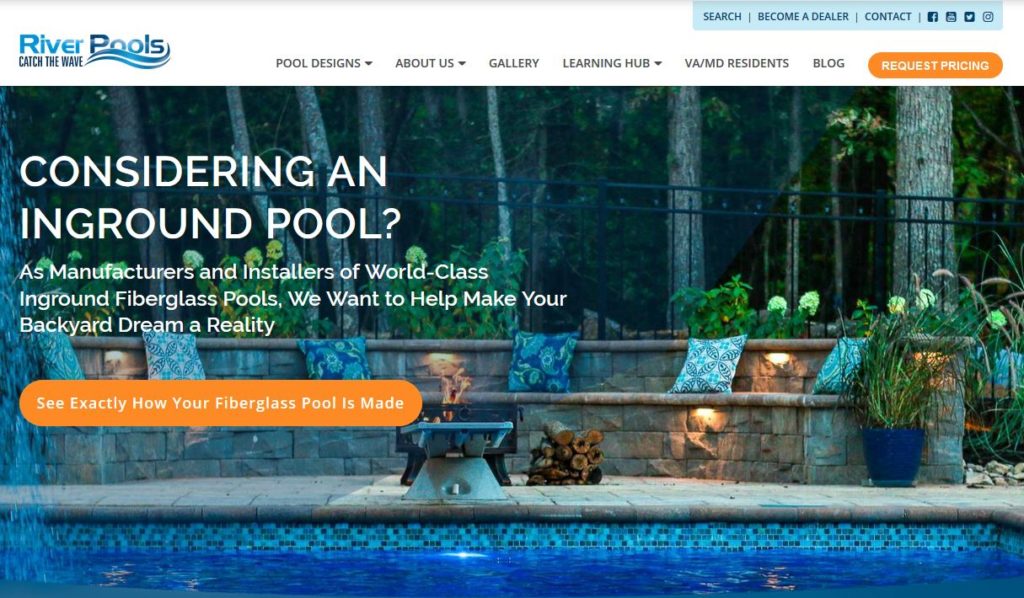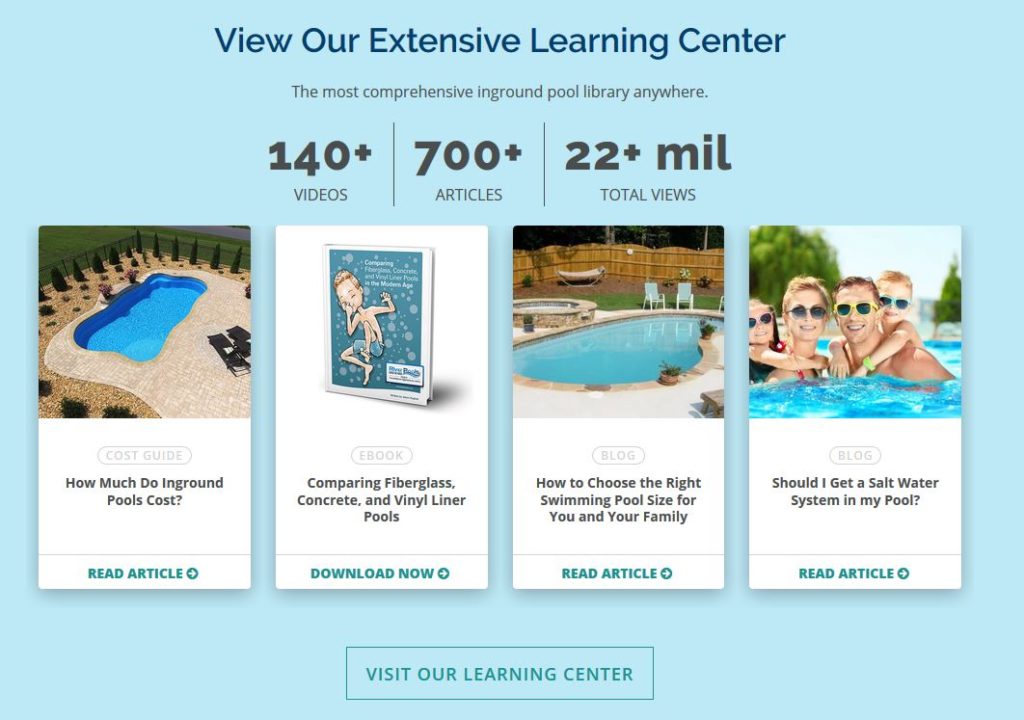
Photo by photosteve101
Imagine that you are working feverishly on a document. Suddenly, the programme you are using shuts down, apparently without any rhyme or reason.
Aargh! What should you do?
Beyond asking your friends or colleagues for help, you are likely to go to Google, type “How to recover data when ______ happens” and seive through its responses.
Guess what? Your customers are doing the exact same thing!
Who do you think would win their trust, affection and debt of gratitude? The one providing the answers to their woes, of course. Unfortunately, this is often likely to come from a third party forum or discussion board.
Is there a way for you to benefit from your customer’s search of answers. Of course!
Simply provide them in the form of Frequently Asked Questions (FAQs).
Riverpools and Spas

One of the best companies I’ve come across that provide comprehensive (and useful) answers to their customer questions is River Pools and Spas. The company is a manufacturer and installer of inground fibreglass pools.
Started by Marcus Sheridan (aka the Sales Lion), the company focuses on answering practically all the questions that their customers have. Each of these Q&As are comprehensive pieces that have very detailed breakdowns and examples.
Today, the company has thousands of articles, videos, templates, guides, and other learning resources on their website. They are also the largest pool building and installing company in the United States!
Here’s a look at their learning page.

The Benefits of FAQs
Since time immemorial, man has been searching for answers. The onslaught of ever sophisticated digital products and services powered by technology has accentuated this need.
With the convenience and ubiquity of search engines on digital devices like laptops, tablets, smartphones and even smart watches, consumers expect to find answers at their fingertips. This is where FAQs come in.
So what are some of the benefits of FAQs?
1) Long-Tail SEO Effects
By answering every conceivable question of significance, you are creating a pipe-line of customer-focused long-tail content. This repository of information can be hugely useful for SEO purposes if you use targeted keywords and phrases that are commonly requested for.
It also allows you to exploit micro-niches of customers with very specific interests or problems.
2) Useful Answers Are Rare
Like it or not, companies tend to avoid answering the tough and probing questions. This could be due to concerns of losing competitiveness, unveiling corporate secrets, or showing possible product weaknesses.
Honestly, such fears are often unfounded in an age where a company’s reputation doesn’t just get dented by a product flaw or two. On the contrary, being open about solving potential issues may help endear you to both present and future customers.
3) Gain Trust, Respect and Authority
In technical focused B2B industries, FAQs may help you to achieve authority. This is especially critical given the paucity of such information on the web. While White Papers and eBooks may up the ante in achieving thought leadership, they aren’t as easy to plough into vis-a-vis FAQs and answers that address every available scenario.
4) Deeper Customer and Corporate Insight
Finally, the discipline of crafting FAQs compels you to understand who your customers are. In the process of developing them, you would have to study various online and offline sources of information to mine the questions and answers.
Doing so also gives you a better sense of your company’s strengths – and weaknesses. It allows you to identify where critical gaps are and to find ways to patch them up.
Crafting Your Questions
Now that we are convinced of the importance of FAQs, how do we start?
The first step is to generate that list of questions. This is probably the easiest part of the process since we are all natural question askers (to some degree or other). Take the following steps:
- Conduct a keyword or phrase research on Google, Bing, Yahoo! and other search engines. There are many tools available like Google’s AdWords Planner or Keyword.io which allows you to locate the most commonly searched for keywords or group of words.
- Focus your research on customer-centric questions. These could cover both questions from prospects on product features and benefits, and questions from customers on solving technical and user related issues.
- Ask your prospects or existing customers. Be thick-skinned enough to poll them for all the questions in the world that they would ask before, during and after the purchase is made. Go ahead and exorcise those sceptical demons in their heads!
- Observe what people are saying online. Use a social media research tool like Hootsuite, Radian6 or Google Trends to suss out what people are saying online related to your business and products. These can be narrowed down to industries, brands, product categories, and markets.
Customer-Centric Answers
Once you have got your questions in place, you need to answer them in a way that addresses the concerns of your prospects in a way that is accessible, human and fun. Consider the following steps:
- Mine your organisation for answers. Don’t leave any stone unturned! Ask front-liners, operation managers, researchers, VPs, heck even your CEO! Remember that how you perform under the heat of customer queries reveals the true mettle of your organisation.
- Write, edit and copy taste. Being meticulous makes a difference in how customers would perceive you. The old adage of more haste less speed certainly applies here.
- Package answers into spreadable content. Where possible, make your FAQs shareable. Include social sharing buttons on your content. Do also make each piece self-contained. By that, I mean that you should write in such a way that each answer is sufficiently detailed to be standalone as a separate content piece that your customers could opt to share with their own networks.
- Deploy images, infographics and videos. For more involved answers, it pays to invest a little more time and effort to create images, infographics and video answers that outline step-by-step guides. Such multi-media content also have a higher chance of being noticed by Google on their Search Engine Results Page (SERP).
- Use Conversational Language that is Fun. In a sea of FAQs rife with dead boring corporate speak, it doesn’t hurt to inject some humour, personality and wit into your answers.
- Check and Verify all Facts. Finally, and most importantly, ensure that your facts and figures are correct. In the event that you made a boo-boo – and who hasn’t honestly? – take immediate actions to correct them and explain the corrections.
Make Your Q&A a Separate Page
There is one important thing you need to note when creating FAQ pages:
You Need To Make Each Question and Answer a Separate Page
Now this is important in order for you to capture the SEO benefits of having FAQs on your website.
While you can still have a generic FAQ page for the more “administrative” questions (like your opening hours, warranties, goods return policies, prices, etc), you ought to turn each of your customer focused questions into an answer.
Learn, Update and Relearn
Last, but certainly not least, it is important for you to update your questions and answers regularly. It is almost a given that the longer your product and service is out in the market, the higher the chances of fresh customer concerns emerging.
To address these, include a Feedback Loop in your FAQ generation process. Do a regular refresh of your content so that it can continually meet the changing demands of your customers.
Once again, online and offline research tools – from Google Trends, AdWords Planner, to your trusty old ear – come in very useful.
Have you started developing online FAQs for your organisation’s products and services? What challenges or opportunities do you see in doing so?
